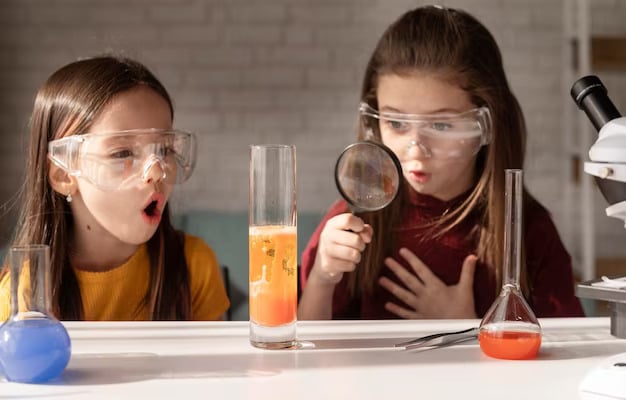Science is All Around You

As we enjoy the arrival of Spring, with the waves of pollen wreaking havoc on our sinuses and covering our cars, windows, and clothes in all its green glory, we also welcome the warmer weather and the numerous flowers budding from the thawing soil. Beyond our tissues from incessant sneezing, there is a world of wonder just waiting to be appreciated.
The children in your classroom are naturally curious and love to learn about the world around them. Teachers can build on children’s inquiries and enthusiasm by helping them discover scientific concepts using classroom materials and the world around them for inspiration.
With the changing of the weather, teachers should be encouraging children to make note of these changes and hypothesize what is happening and why. Ask children what they hear, see, feel, or experience while they play outside. As flowers come into bloom, teachers could have the children draw their observations in notebooks while outside or use magnifying glasses to get a closer look at all the different parts of a plant, or even at the caterpillars eating the leaves.
Another great way to get children to understand scientific concepts in your classroom is to design and implement long-term studies. When engaged in a long-term study of a particular topic, children are observing and experience that topic over a few weeks or even a few months. This gives children ample time to explore the many different components of a given topic. One common long-term study could be planting a classroom garden. Gardens help children observe firsthand growing cycles, food chains, habitats, and even insects.
When choosing a long-term study always respond to the children’s interest (as this will ensure their participation) and be sure to refer to your age-appropriate state standards to plan out ways to address them. Once a topic has been agreed upon between you and the children, have the children help research the topic by using classroom books, articles, or other information sources to help the children gain a better understanding.
We here at H&H Child Care Training (ChildCareEd) have created courses to help you with your scientific discoveries, such as:
Tomorrow’s Einsteins: Infant and Toddler Science
Meaningful Lesson Planning for Infants/Toddlers
Project Based Learning for Children
H & H Child Care Training (ChildCareEd) Courses grant .2 CEUs or more as well as awarding state-approved clock hours of 2 or more for all childcare centers, and family childcare providers in many states. Check with your licensing agency to check for any additional requirements and to see if we are approved in your home state. Click here to search our vast list of science courses and schedule your next online training today!
- Pediatric RSV First Aid & CPR/AED
- Pediatric Blended First Aid & CPR/AED Adult, Child, Infant
- Pediatric In-Person First Aid & CPR/AED Adult, Child, Infant
- Asthma, Allergy and Anaphylaxis Prevention and Management Training for Early Education Providers
- 45 Hour Preschool Methods and Materials
- 45 Hour Child Growth and Development
- 45 Hour Infant and Toddler Methods and Materials
- 45 Hour School Age Methods and Materials
- Science is All Around You
- National Static Electricity Day
- Nurturing Safe and Engaging Experiences: The Essential Role of Child Supervision in Houston's Summer Activities
- Field Trip Guide for Michigan Providers
- The Power of Play: Unleashing Potential in Early Childhood Education
- School Days, Fun Ways: Designing a Curriculum for the Big Kids
- Little Einstein’s Lab: Fun DIY Science Activities for Early Learners
- St. Patrick’s Day Activities for Kids: Fun, Educational, and Easy Ideas for Parents & Teachers
- 🎉STEM-sational Fun: How Can You Spark Preschoolers’ Curiosity with Engaging STEM Activities? 🔬🧪🔢
- Play, Explore, Grow: Fresh Curriculum Ideas to Spark Joy in Your Preschool or Daycare
- What’s Going On in a Child’s Brain When They Play?
- What Are Creative Ways to Use Nature as Your Classroom?
- Early Childhood Education
- Field Trips in Minnesota: A Great Way to Learn and Explore
- Field Trip Ideas in Pennsylvania: Fun, Educational Adventures for Children
- Groundhog Day Activities
- ☃️ Frosty Fun in the Classroom: Winter Activities That Teach
- Seuss-tastic Fun: Easy Activities for Dr. Seuss’s Birthday